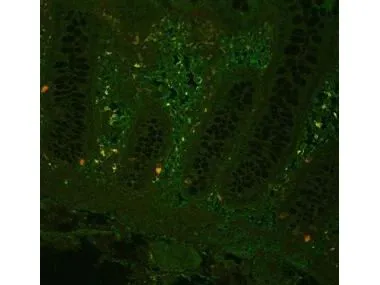TNF alpha antibody
GTX10949
ApplicationsWestern Blot, ImmunoHistoChemistry, Neutralisation/Blocking
Product group Antibodies
TargetTNF
Overview
- SupplierGeneTex
- Product NameTNF alpha antibody
- Delivery Days Customer9
- Application Supplier NoteWB: 0.1 microg/ml. IHC: 5-15 microg/ml. Neutralizing/Inhibition: 0.02-0.12 microg/ml. *Optimal dilutions/concentrations should be determined by the researcher.Not tested in other applications.
- ApplicationsWestern Blot, ImmunoHistoChemistry, Neutralisation/Blocking
- CertificationResearch Use Only
- ClonalityPolyclonal
- ConjugateUnconjugated
- Gene ID7124
- Target nameTNF
- Target descriptiontumor necrosis factor
- Target synonymsDIF, IMD127, TNF-alpha, TNFA, TNFSF2, TNLG1F, tumor necrosis factor, APC1 protein, TNF, macrophage-derived, TNF, monocyte-derived, TNF-a, tumor necrosis factor ligand 1F, tumor necrosis factor ligand superfamily member 2, tumor necrosis factor-alpha, tumor necrotic factor alpha
- HostGoat
- IsotypeIgG
- Protein IDP01375
- Protein NameTumor necrosis factor
- Scientific DescriptionTumor Necrosis Factor-Alpha (TNF alpha) is a protein secreted by lipopolysaccharide-stimulated macrophages, and causes tumor necrosis when injected into tumor-bearing mice. TNF alpha is believed to mediate pathogenic shock and tissue injury associated with endotoxemia. TNF alpha exists as a multimer of two, three, or five noncovalently linked units, but shows a single 17 kDa band following SDS-PAGE under non-reducing conditions. TNF alpha is closely related to the 25 kDa protein Tumor Necrosis Factor beta (lymphotoxin), sharing the same receptors and cellular actions. TNF alpha causes cytolysis or cytostasis of certain transformed cells, being synergistic with interferon-gamma in its cytotoxicity. Although it has little effect on many cultured normal human cells, TNF alpha appears to be directly toxic to vascular endothelial cells. Other actions of TNF alpha include stimulating growth of human fibroblasts and other cell lines, activating polymorphonuclear neutrophils and osteoclasts, and induction of interleukin 1, prostaglandin E2 and collagenase production. TNF alpha is currently being evaluated in treatment of certain cancers and AIDS-Related Complex.
- Storage Instruction-20°C or -80°C,2°C to 8°C
- UNSPSC12352203

![Sandwich ELISA analysis of serial diluted recombinant human TNF alpha using GTX15792 TNF alpha antibody [2TNF-H33] (Biotin) (detection antibody) in duplicate at 2, 1, 0.5, and 0.25 microg/ml and rabbit anti-Human TNF (capture antibody) at 5 microg/ml.](https://www.genetex.com/upload/website/prouct_img/normal/GTX15792/GTX15792_70_ELISA_w_23060620_886.webp)
![ELISA analysis of 1 microg/mL human recombinant protein TNF alpha diluted in carbonate/bicarbonate buffer using serial diluted GTX15793 TNF alpha antibody [2TNF-H34A].](https://www.genetex.com/upload/website/prouct_img/normal/GTX15793/GTX15793_71_ELISA_w_23060620_757.webp)
![ELISA analysis of human TNF alpha recombinant protein using GTX17581 TNF alpha antibody [E10043]. Antibody concentration : 1:25, 1:50, 1:100, 1:200, 1:400, 1:800, 1:1600, and 1:3200 (90 minutes at 37oC) Coating : 1 microg/mL human TNF alpha recombinant protein](https://www.genetex.com/upload/website/prouct_img/normal/GTX17581/GTX17581_20180525_ELISA_w_23060620_719.webp)

![Indirect ELISA analysis was performed by coating the plate with recombinant 293T expressed, human Fc- tagged TNF alpha(54-233 a.a.) (201.71-3.15 nM). Coated protein was probed with TNF alpha antibody [2C8] (GTX28348) (1 microg/mL). Goat anti-mouse IgG antibody (HRP) (GTX213111-01) (1:10000) was used to detect the bound primary antibody.](https://www.genetex.com/upload/website/prouct_img/normal/GTX28348/GTX28348_45070_20230526_ELISA_Indirect_23053001_503.webp)
![Indirect ELISA analysis was performed by coating the plate with recombinant 293T expressed, human Fc- tagged TNF alpha(54-233 a.a.) (201.71-3.15 nM). Coated protein was probed with TNF alpha antibody [F6C5] (GTX28349) (1 microg/mL). Please notice that GTX28349 needs to be conjugated to biotin to function as the detection antibody. Please contact us for custom biotin-conjugated antibody.](https://www.genetex.com/upload/website/prouct_img/normal/GTX28349/GTX28349_45059_20230526_ELISA_Indirect_23053001_612.webp)